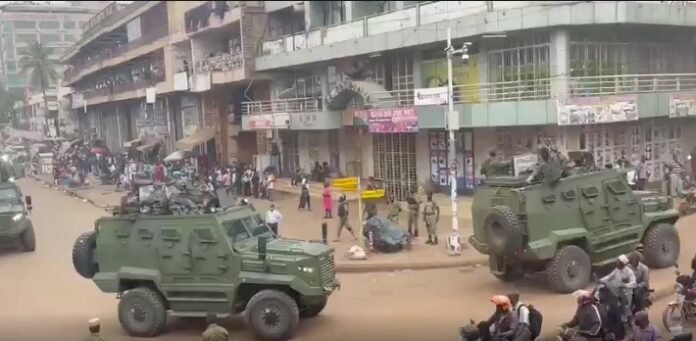
The unfunny joke in many constitutions in Africa is the slogan, “power belongs to the people.” It never does.
What actually happens is that the thing called the state – reduced to just a few people – is often far stronger than the people. Indeed, there exists a clear disconnect between the state and the governed. This state of affairs is very common in polities where slogans such as “no change” are highly valued.
A man or a group of men stay in power for too long that they even start calling themselves “parents of the country”— and the governed, “their children,” and “grandchildren.”
These labels could be cheeky, but under their condescending posture lies a terribly mischievous plot. The so-called grandparents start to act as “owners” of the country – and everyone else ought to kowtow to their whims. With the state being buttressed on controlling the tools of violence – prisons, guns, military uniforms, armoured vehicles, tax collection bodies – these few people use these tools to steal from the governed, while at the same time beat them to size.
Their use of violence is often disorderly. It is anarchic: summary public executions (Afande Felix Kaweesi, Afande Muhammad Kirumira, Ibrahim Abiriga, Zebra Mando, etc.); torture, imprisonments and official kidnaps (Nalufenya, safe houses, Kireka) and many other forms of state hooliganism.
But, is the violence of the state absolute? Do the so-called people—in the constitution—have power over the exercise of state violence? If so, how do the governed control the disorderly violence of the state?
How do they respond when the people in power become hooligans, and use their control over guns, prisons, tanks, courts and military uniforms for political ends? How do ordinary folks reclaim the joke in the constitution into a meaningful statement?
Let me answer these questions straight up: it is only after the people, the governed, have assured the state of their power of violence that the state’s violence can be consistently orderly. Let me phrase it differently: it is a game of assured mutual destruction with the governed on the one side, and the state on the other.
For the state to exercise its violence in an orderly fashion – as spelled in the state’s constitution to apply to all – the governed have to demonstrate, or must have demonstrated before, that they are capable of equal amounts of disorderly violence.
Against this, those in charge of the state act on the understanding that what they hold in their hands – tools of violence – has to be used with the approval of the governed. Of course, the governed do not have to constantly demonstrate that they are capable of equally disorderly violence.
But they have to have created a sensibility, an understanding on the part of those in power, that they are capable of large-scale disorderly violence (at the slightest provocation). One would then ask, by what yardsticks to do ordinary folks conclude that those in power are using the violence of the state without order and for political ends?
In truth, there are no scientific yardsticks upon which state hooliganism is measured. But, rather, the general pulse of the country. Orderly state violence has to be seen, not to be explained. And once it becomes invisible to the ordinary eye, the governed use violence to reclaim the decency of the state.
Please note that all open violence is often followed by structured forms of violence – such as selfish legislations and directives. There are too many of these in our modern autocracies.
As Uganda heads into the election, and with constant reminders from our many soldiers in power that “the state will kill your children,” and “we will crush them,” and “police has a right to shoot you”, we need to return to these questions of violence of the state against the violence of the people.
Even those calling for peace on elitist chants such as “I choose peace” or “commit to peace,” have to understand that the onus to keep peace lies solely in the hands of those entrusted with the tools of coercion.
The governed will only turn to disorderly violence as a gentle reminder to those in power not to abuse the tools of violence which they entrusted them with.
The point I am making – which should be obvious by now – is that before the Ugandan security forces, and the sitting president are (practically or theoretically) convinced that ordinary folks are capable of even more violence, they will never be orderly or non-partisan in their use of state violence.
Authored by Yusuf Serunkuma for The Observer. Serunkuma is a political theorist based at Makerere University















